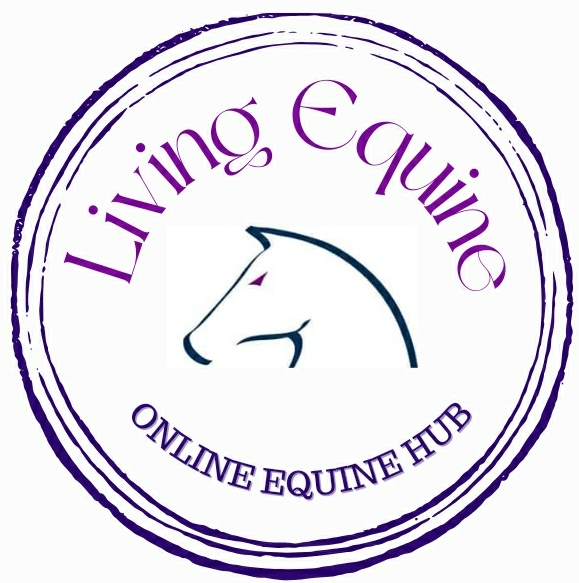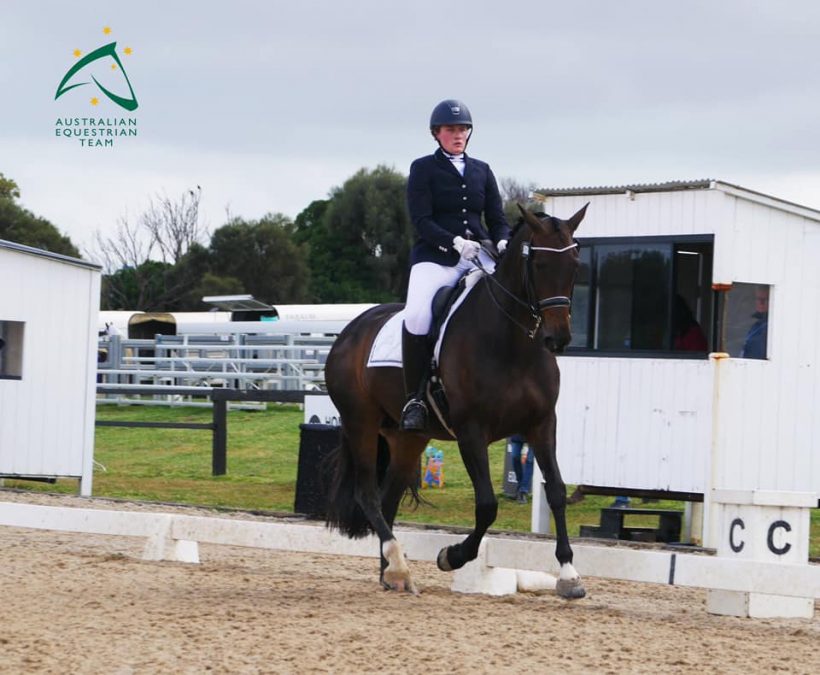Name: Matilda Carnegie
How old you are? 22 years old
Where you are based? I’m in Melbourne and Tilly (Devils Chocolate) is based in Macedon.
 –
–
Can you explain a little about your disabilities and how it affects you in everyday life?
I am profoundly deaf (not classifiable for Para-Equestrian), I wear a cochlear implant to help but my hearing still isn’t great, so I struggle with background noise and in conversation with many people involved, and it can be socially isolating. Luckily I can pick and choose when I want to hear, and I use that to my full advantage!
I have a foot condition called macrodactyly, which if left untreated means that the limb grows too big for functional use, so I have had five surgeries which has left my foot half missing. I walk around with a limp and experience a lot of joint and nerve pain. However I count my blessings that I am able to walk.
I have a neurological condition called dystonia, which used to make me seize up as a young child, but now effects my core strength, coordination and balance, especially on my right side.
You’re currently Grade 4 Para Dressage Rider, can you please explain to the public how did you get graded that level, and what sort of movements you have to do in dressage?
Every rider has to go through the same system of classification. First you have to fill out several forms outlining impairment, background story etc. to give the classifiers the full picture about your impairment. You have to send through medical documentation, scans and X-rays to demonstrate your impairment. Then you will be classified by two international classifiers, who will do a range of tests on strength, mobility, range and coordination that is specific to equestrian. They will mark it out of 5 (where 5 is normal range and 1 is severely impaired)… then they will allocate you a profile and grade. There are five grades, grade one is most disabled and grade five is the least disabled, and it has to do with physical ability not riding ability.
Grade para tests are done at walk only. Grade two is walk and trot with all lateral work, canter is not allowed in the freestyle. Grade three is walk, trot, with option for canter in the freestyle. Grade 4 is walk, trot, canter with lateral work, with option for half passes and single flying changes in freestyle. Grade 5 is walk, trot, canter and all lateral work, with option for Prix St George movements in the freestyle. However Para Riders also are allowed to compete able-bodied and the sky is the limit, plenty of the international Para Riders are very good FEI riders and often have competed at Grand Prix.
Do you have a support group or team that helps prepare and get you to competitions? And if so where do you think you would be without them today ?
Many people have got me to where I am today, and it’s a constant learning curve. Grateful to all the coaches, grooms, friends who have all supported me along the way.
You are currently aiming for Tokyo Olympics, can you tell us about how you’ve been preparing for that?
Basically I ride 4-5x a week, go to the gym 4-5 a week, do physio once a week and walk around as much as I can. I also watch as many videos of the best Para Riders in the world, and try to replicate that level of riding to the best of my ability. I spend a lot of time drawing out my tests, reading up on the dressage literature to give myself some of that theoretical understanding, critique my riding videos, visualise the tests I have to ride. I have gotten very obsessive and quite critical of myself, but because the standard has gotten so high in Para-Equestrian in Australia and overseas, to truly make it, you have to be that way.
Do you have a regular warm up routines you do when you go to competitions?
I like to listen to really upbeat music to get myself in the zone. I go through the test a few times in my head to visualise how I want it to go… but avoid doing it too much as otherwise I stress myself out about what could go wrong. I like to also stretch my body out just to make sure I am supple when I get on the horse. When at a show, even though I usually have a groom, I like to take my horses for walks etc and give them treats so I can really be on the same wavelength with my horse when I compete.
Best memory with your competition mare Devils Chocolate so far?
Making the long list for the 2020 Tokyo Paralympic Team and the journey behind it, even with its ups and downs. Tilly is an awesome mare and she always has my back no matter what. I trust Tilly with my life and having that bond is so special. Tilly, like all good mares, chose me as her person and we just get each other, we are both strong-willed and impatient, but also tough as nails and able to fight the good fight.
However the most special memory was competing at national level in the Prix St George classes with Tilly at Willinga Park, it was a huge thrill and that will stay with me forever.
Any quirks about Devils Chocolate?
She is honestly such an angel and is one in a million… you can take her anywhere and literally nothing phases her. However she is a typical mare, so she does have an opinion and is the most no-nonsense gal I’ve met, so if she’s going to fight for you she has to like you. She can come across as quite grumpy and definitely is quite fussy over who she likes. She is a queen and she knows it, so expects everyone to treat her with respect.
Do you get nervous when competing, and is there anything you do to reduce or get rid of the nerves?
I used to get very nervous and often would throw up before I competed. It got to the point that the nerves threatened to end my riding career before it ever really took off. Luckily for me at the time I had a coach who was great at all things regarding rider psychology, so I got through it in large part thanks to her. However I have found that the more I compete and conditioned myself for all sorts of situations that I generally don’t really get nervous anymore, and am just focused on doing the best I can on the day.
I probably shouldn’t say this, and this won’t win me a popularity contest, but the fundamental thing to reducing nerves is choose yourself a realistic horse that is suitable for your riding and physical capabilities, and set yourself attainable goals. Be realistic about the time it takes to reach your wildest aspirations, Rome wasn’t built in a day and neither was an Olympic rider.
Has anyone given you a piece of advice that you kept with you and implemented?
Always turn up and work hard, even if it’s the last thing you want to be doing. You never know what can happen, but if you don’t turn up nothing will happen! Bad stages never last and only make the good bits even the sweeter.
What would be the best advice you could give to anyone wanting to do sport or is in a sport?
In all sports you can’t get anywhere without having a great team around you. It is really important that you pick people who truly believe in you, and where you as an athlete can go. Your team needs to be prepared to be by your side, even when things go really wrong. And be grateful to everyone who has helped you along the way.

Feature Image and Article Images courtesy of Tilda Carnegie Para Equestrian and the Australian Equestrian Team.


I’m grade 4 as well, but am in awe of what you are achieving in dressage. Our forte is showjumping and xc; Good luck xx